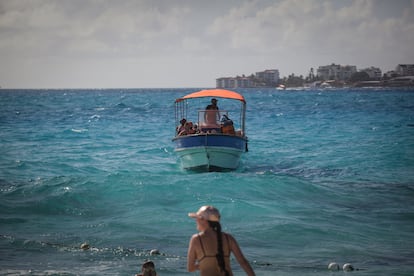Italian tourist dies after shark attack on San Andres island in the Colombian Caribbean
The victim was swimming in an area frequented by snorkelers when the animal bit his leg

An Italian tourist died on Friday after a shark attack on San Andres island in Colombia’s Caribbean region. The man was in the water when the animal approached him and bit his right thigh. Though he managed to escape and was taken to the hospital, he died as a result of blood loss.
A spokesperson from the San Andres government insisted that this type of attack is rare. The region is known to tourists as La piscinita, or the swimming pool, and its clear waters count as one if its primary tourist attractions “There are even professional snorkeling tours in which sharks pass nearby, but nothing has ever happened. It could be a visiting species,” the spokesperson said.
Mirla Zambrano, a 50-year-old woman who has been a certified snorkeler for three decades and works nearby, was in shock. “We’re all very surprised. It’s the first time that a shark attacks a tourist in San Andres,” she said. Zambrano said that tourists normally encounter small fish.
“I’ve felt very safe all week. I did a snorkeling course and what I saw the most were swordfish, manta rays and coral,” said Francisco Aguado, a 27-year-old Spanish tourist who is visiting the region.
A video circulating on social media shows two tiger sharks in shallow waters in the south of San Andres, near the beach where the tourist was swimming. “They are two large tiger sharks (Galeocerdo cuvier), whose identification was confirmed by national experts. This species is common in the Caribbean and tends to spend the daytime in deep waters and feed in shallow waters at night. There are reports of the species in the whole archipelago. However, it is rare to see them during the day,” authorities explained in a statement.
Because of the incident, swimmers have been advised to avoid the sea in the coming days. The sharks are in their habitat, the statement explains, and humans are disturbing them. According to the official source, a local resident had warned of the sharks’ presence before the attack.
The experts have also noted that among the 500 known species of sharks, only a few have ever attacked human beings. “Meanwhile, 100 million sharks are caught every year. Their meat and fins are the most common commercial product.”
In Colombia, at least 10 species are endangered, according to the ministry-sponsored guide Libro rojo de peces marinos (or Red book of marine fish). “The immense biodiversity in the San Andres Archipelago has always caught the eye of illegal fishermen,” says the World Wildlife Fund (WWF). For that reason, Colombia’s Ministry of the Environment completely prohibited the fishing of sharks and rays in 2017.
Tu suscripción se está usando en otro dispositivo
¿Quieres añadir otro usuario a tu suscripción?
Si continúas leyendo en este dispositivo, no se podrá leer en el otro.
FlechaTu suscripción se está usando en otro dispositivo y solo puedes acceder a EL PAÍS desde un dispositivo a la vez.
Si quieres compartir tu cuenta, cambia tu suscripción a la modalidad Premium, así podrás añadir otro usuario. Cada uno accederá con su propia cuenta de email, lo que os permitirá personalizar vuestra experiencia en EL PAÍS.
¿Tienes una suscripción de empresa? Accede aquí para contratar más cuentas.
En el caso de no saber quién está usando tu cuenta, te recomendamos cambiar tu contraseña aquí.
Si decides continuar compartiendo tu cuenta, este mensaje se mostrará en tu dispositivo y en el de la otra persona que está usando tu cuenta de forma indefinida, afectando a tu experiencia de lectura. Puedes consultar aquí los términos y condiciones de la suscripción digital.









































